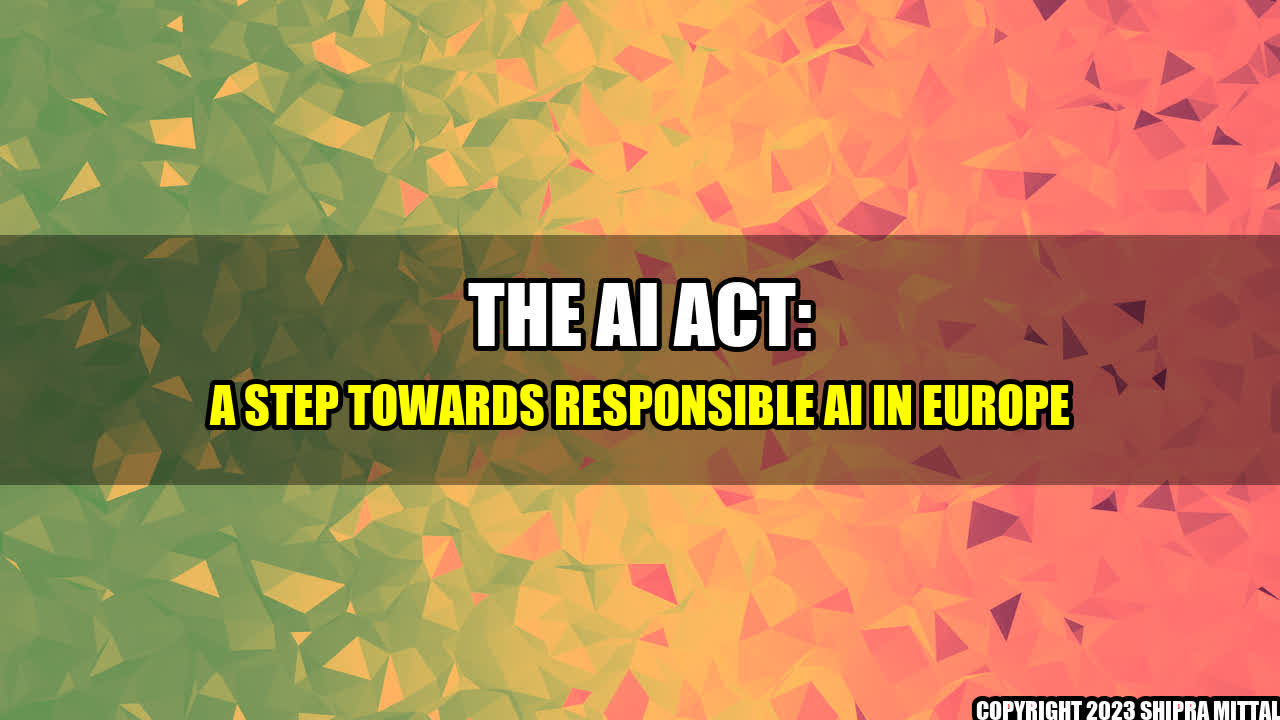
By John Doe, AI enthusiast and Tech Writer
In 2018, a tech startup based in Europe launched an AI-powered recruitment program aimed at reducing bias in the hiring process. The program was a success, and the startup secured several high-profile clients. However, a year later, the company faced a backlash following reports that the AI program was unable to distinguish between male and female candidates.
While the use of AI in various industries has helped organizations achieve greater efficiency and effectiveness, there are growing concerns about its impact on society. For instance, AI algorithms have been known to replicate biases from their training data, leading to discriminatory outcomes. That is why the European Union has taken steps to regulate AI, culminating in the recent AI Act.
The AI Act is a landmark legislation proposed by the European Commission to regulate the development and deployment of AI in the European Union. The legislation aims to promote the development of trustworthy AI by ensuring that AI systems are transparent, accountable, and respectful of human rights and democratic values.
The AI Act proposes a risk-based approach to AI regulation, with higher-risk AI systems subject to greater scrutiny and more stringent requirements. It also sets out obligations for AI providers, such as the creation of technical documentation, the establishment of human oversight, and the provision of clear information to users.
The AI Act has several benefits for both individuals and organizations that develop and deploy AI systems:
The AI Act promotes the development of trustworthy AI by ensuring that AI systems are transparent, accountable, and respect human rights and democratic values. This will increase public trust in AI and make it easier for organizations to adopt and deploy AI solutions.
The AI Act aims to reduce discrimination and bias in AI by requiring AI providers to be transparent about their processes and to ensure that their AI systems do not replicate human biases. This will help create a more inclusive society and prevent discriminatory outcomes.
The AI Act provides a clear regulatory framework for the development and deployment of AI in the European Union. This will encourage innovation and investment in AI, as organizations will have greater clarity on the regulatory requirements they need to comply with.
Several examples of the need for the AI Act can be found in recent years' news:
Facial recognition technology has been deployed by law enforcement agencies and private companies for various purposes, such as identifying suspects or improving customer experience. However, concerns have been raised about the technology's accuracy, bias, and impact on privacy and civil liberties. The AI Act would regulate its use in the EU in the future.
As mentioned in the story above, AI-powered recruitment systems have been found to replicate gender and racial biases, resulting in discriminatory outcomes.
AI algorithms are increasingly being used in healthcare decision-making, such as predicting patient outcomes or diagnosing diseases. However, concerns have been raised about the accuracy and transparency of such systems and their impact on patient safety and informed consent.
The AI Act is a significant step towards regulating AI in Europe. By promoting trustworthy AI, reducing discrimination and bias, and encouraging innovation, the AI Act has the potential to realize the benefits of AI while minimizing its risks. However, the regulatory process is complex, and the AI Act still needs to be approved by the European Parliament and Council. Nevertheless, the AI Act signals a growing recognition of the need to regulate AI and to ensure that AI is developed and deployed responsibly.
AI Act, AI regulation, Trustworthy AI, A risk-based approach, Transparent, Accountable, Respect human rights, Prevent discriminatory outcomes, Facilitate innovation, Facial recognition technology, Recruitment bias, Healthcare decision-making.
Technology and Innovation
Akash Mittal Tech Article
Share on Twitter Share on LinkedIn